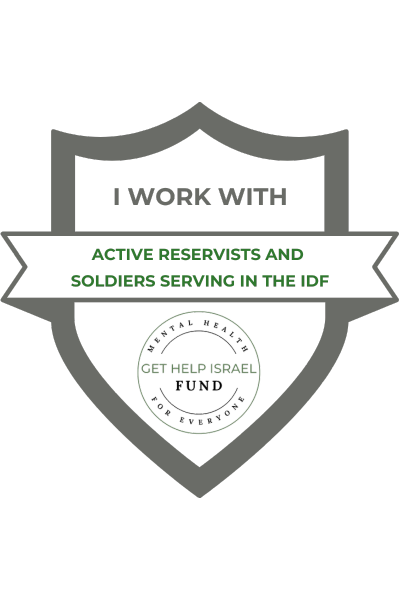Asher Siegelman
Credentials
Finances
Licensed in Israel
- HaGaon M'Vilna 6/1
- Beit Shemesh
Asher Siegelman
 Verified
Verified
Credentials
Clinical Psychologist
PhD
Finances
700+ NIS
N/A
Free Consultation
ABOUT THE THERAPIST
I help people address the psychological pain that contributes to their suicidal thoughts and feelings with a direct, tailored, connection driven approach without the use of medication or hospitalization.
While I work as a clinical psychologist, my area of expertise centers around clinical suicidology. This means that my main focus is on educating, training, assessing, treating, and designing programs to prevent suicide. During my graduate training, I had the privilege of learning under the guidance of Dr. David Jobes, the founder of CAMS (Collaborative Assessment and Management of Suicidality) care, one of the most well-known approaches to effectively helping people who are suicidal.
I'm deeply committed to addressing the global shortage of suicide-focused care, including here in Israel. My goal is to establish a comprehensive system of care that reduces suffering and, most importantly, saves lives. Please visit israelsuicideprevention.com
Adults and adolescents who struggle with:
suicidal ideation
suicidal behaviors
post-hospitalization following a suicide attempt or severe suicidality
QUALIFICATIONS
PhD
The Catholic University of America
2021
Degree
PhDEducation
The Catholic University of AmericaYear of Graduation
2021Years in Practice
4
REGISTERED PSYCHOLOGIST IN ISRAEL
Registration in Pinkas Hapsichologim
27-177298
Mumche Category
Clinical Psychologist
Mumche License Number
#27-177298
DISTANCE COUNSELING
Online Therapy
PRIMARY SPECIALTIES
Anxiety / Panic
Depression
Psychological Assessment
Self-Harm / Suicide
Trauma / Post Traumatic Stress Disorder PTSD
ADDITIONAL SPECIALTIES
Infertility
Parenting Issues / Training
Phobias
Schizophrenia / Psychosis
Sexual Abuse / Rape
Stress Management
CLIENT FOCUS
Population
Adolescents
Adults
Families
Men
Women
Languages Spoken
Hebrew
English
TREATMENT APPROACH
Acceptance and Commitment Therapy (ACT)Acceptance and Commitment Therapy (ACT) is a form of psychotherapy that encourages individuals to accept their thoughts, feelings, and experiences without judgment and to use them as tools to help them to make changes in their lives that are consistent with their values. It is based on the idea that by changing the way we think about our inner experiences, we can reduce emotional distress and increase our sense of well-being.
Cognitive Behavioral Therapy (CBT)Cognitive Behavioral Therapy (CBT) is a type of psychotherapy that focuses on how one's thoughts, feelings and behaviors are connected and can be changed. It is based on the idea that how we think (cognition) and how we feel (emotion) can influence how we behave. CBT helps people identify and challenge distorted thinking and replace it with more balanced thinking, leading to improved mood and behavior. ‘Homework’, usually containing practical writing exercises, is often completed by the client between sessions to reinforce the therapy. Examples of tools that practitioners often use are journaling, challenging beliefs, and mindfulness.
Cognitive Processing TherapyCognitive Processing Therapy is used to treat trauma and PTSD. During therapy, clients identify and understand their beliefs about their responses to their trauma. Inspecting their beliefs often leads clients to understand their emotions and thoughts in relation to the trauma. When the client is ready, practitioners give them tools to challenge their thoughts of the trauma as well as provide homework to solidify what they learned in sessions. In the later stages of therapy, practitioners teach clients how belief systems (about safety, self-esteem, trust, intimate relationships, control, and power) can change after trauma.
Emotion-Focused TherapyEmotion-focused therapy (EFT) is a type of psychotherapy that is based on the idea that emotions play a key role in a person’s mental health. EFT focuses on helping people to identify, accept, and manage their emotions in a healthy and productive way. The goal of EFT is to help people identify and express their emotions, understand how those emotions impact their behavior, and learn how to manage their emotions in a way that is adaptive and healthy. EFT is a research-based approach to psychotherapy that has been found to be effective in helping people manage a variety of mental health conditions. It has been used successfully in the treatment of individuals, couples, and families, as well as with groups. EFT is particularly beneficial for people who struggle with emotional regulation, mood disorders, anxiety, trauma, and relationship issues.
Person-Centered Therapy (Rogerian Therapy)Person-centered therapy, or Rogerian therapy, was developed by Carl Rogers in the 1940’s. It is a form of talk therapy that emphasizes the importance of providing psychological safety, unconditional positive regard, and empathic understanding to clients. This type of therapy is based on the belief that individuals have an innate capacity for self-actualization and self-understanding and that the therapist's role is to provide a supportive environment in which this process can take place. Through the use of active listening, open-ended questions, and non-judgmental reflection, the therapist helps the client to explore their thoughts, feelings, and experiences in a safe and accepting environment. By doing so, clients are able to gain insight into their issues, develop a greater understanding of themselves, and work towards personal growth.
Prolonged Exposure
SERVICES OFFERED
Individual Therapy
Consultation
Workshops/Educating

 Verified
Verified


